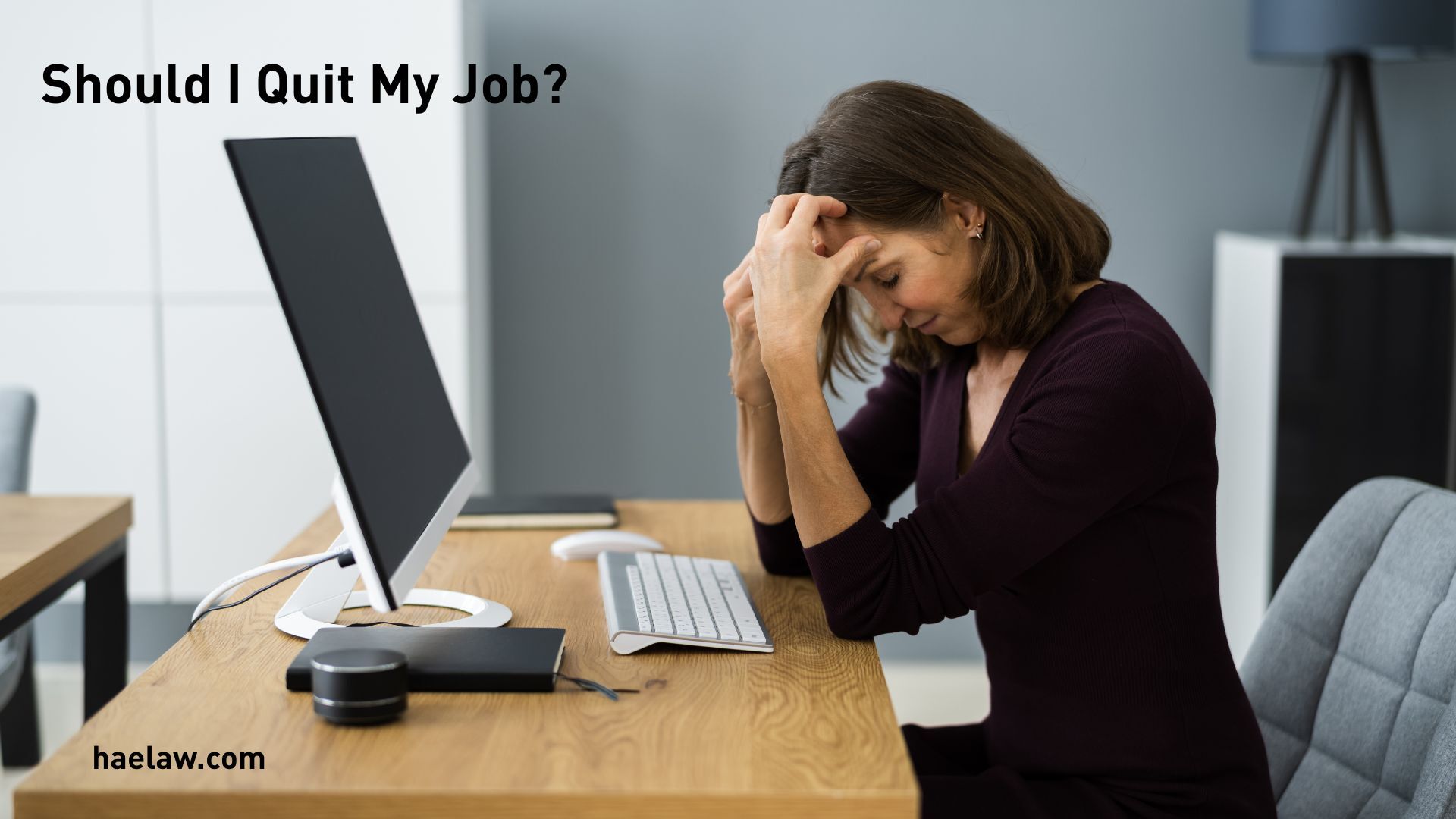We are often asked by employees: “Should I quit my job?” That is your decision to make, we cannot make it for you. Here’s what we want you to know before quitting.
We don’t suggest staying in a toxic or unsafe environment longer than necessary but quitting too quickly—or worse, quitting in the heat of the moment—can take away critical protections, resources, and legal rights. That said, your physical and mental health must always come first. If your workplace is putting your safety or well-being at serious risk, you should never jeopardize your health for the sake of strategy. Sometimes stepping away immediately is the best choice, but when possible, it’s important to make a plan before you resign.
Avoid Quitting Without a Plan
Unless you are in immediate danger, quitting impulsively can harm your future options. Leaving suddenly can:
- Give your employer a defense against unemployment, workers’ compensation, or legal claims
- Forfeit your eligibility for unemployment benefits
- Eliminate your chance to negotiate severance
- Cut off health insurance and benefits right away
- Leave you without income before you secure another job
Compensation through unemployment, lawsuits, or workers’ comp rarely comes quickly. While walking away might feel like relief in the moment, rushed decisions often lead to long-term setbacks.
Don’t Quit Without Legal Guidance
Before resigning, it’s important to understand what qualifies as a legal claim. Unfortunately, the law doesn’t allow you to sue simply because a boss is rude, yells, or creates a generally “toxic” environment. Our hostile work environment page explains further.
But if you are experiencing discrimination, retaliation, or sexual harassment, quitting before speaking to an employment attorney who represents employees can weaken your position. Once you resign, many potential claims are harder—though not always impossible—to pursue.
What feels like taking back control can actually give your employer more power. Consulting with an attorney before quitting helps you understand your rights, preserve leverage, and explore your legal options.
Protecting Your Health Without Sacrificing Your Rights
We know how unbearable harmful workplaces can become, and we never recommend risking your health just to preserve legal claims. Your mental and physical well-being must always come first.
If the stress, anxiety, or depression from your job is overwhelming, speak with your healthcare provider about medical leave. Depending on your employer’s policies and your doctor’s documentation, you may qualify for sick leave or short-term disability leave.
Taking leave can:
- Give you time to plan a safe, strategic exit
- Preserve your legal rights
- Maintain your health insurance during a critical period
- Provide medical documentation of the harm you’ve experienced
- Keep your job and income intact while you consider next steps
Workplace stress and mental health conditions are valid reasons for medical leave when properly documented. While visiting a doctor or therapist can feel like an additional burden—especially financially—failing to seek medical care can cost you far more in the long run.
Recognize the Financial Burden
We know that many employees simply cannot afford to walk away without another job lined up. The financial pressure of staying in a harmful workplace while trying to plan your exit can feel overwhelming.
That’s why a strategic plan matters so much. Careful preparation helps you protect income, benefits, and your legal rights while building a safety net for your next step. It may not remove the stress entirely, but it can lessen the burden and give you more control over your future.
What Should Be in Your Strategic Plan
The best time to quit is after you’ve protected your health, rights, and financial security. A strong plan includes:
- Health protection: Address immediate concerns with your doctor. Take approved leave if necessary. Have a plan for health insurance coverage in case of a gap.
- Documentation: Report issues to HR or your manager in writing and keep copies. Document incidents in a journal with names, dates, times, and details. Save text messages or screenshots as evidence. (Be sure to follow your company’s handbook policies when handling documents.)
- Legal clarity: Speak with an employment attorney who represents employees so you fully understand your rights.
- Financial preparation: Build a cushion or secure your next opportunity.
- Strategic timing: Position yourself to negotiate the best possible exit terms.
Leaving without these protections may close doors you didn’t realize were available. Leaving with them puts you in control.
Bottom Line
The decision to quit is never easy. You may be experiencing sexual harassment, discrimination, or working under a boss who makes every day miserable. While the impulse to walk out is understandable, your exit is too important to leave to impulse.
Take the time to plan. Talk to your doctor. Speak with a legal professional. Build a strategy that safeguards your health, your rights, and your financial future.
Your well-being must always come first—but with support, patience, and a clear plan, you can leave on your own terms and step into the next chapter with strength and security.
At Haeggquist & Eck, we offer free, confidential, no-obligation case evaluations. We work on a contingency fee basis, meaning you pay no upfront costs—we only get paid if you do. When you’re ready to stand up, we’ll stand with you!





